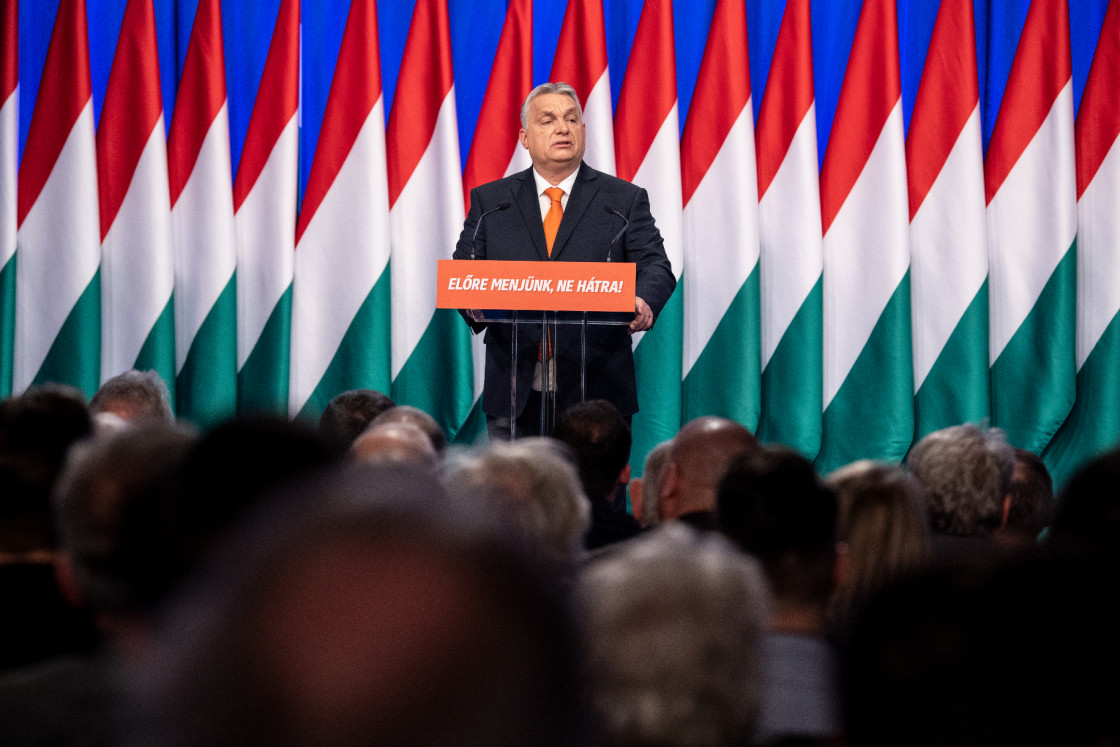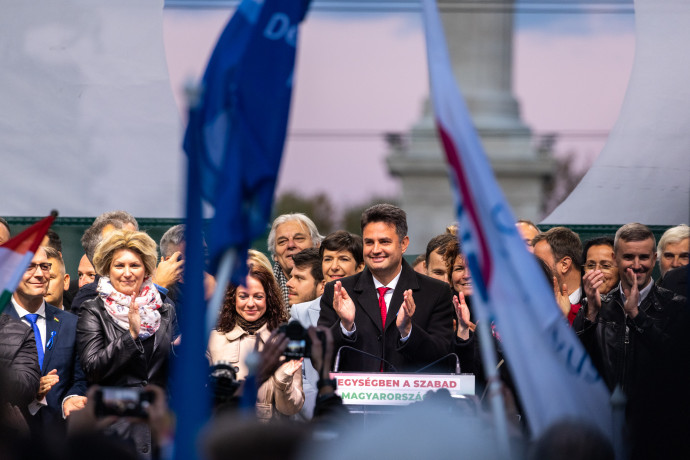
Campaign vibes from turbo-folk mode to a sleeper that must awaken
How is it possible that after 12 years of Fidesz’s rule — which is generally described as authoritarian — the governing party still has a great potential for victory again? First, we provide five takeaway points on why Fidesz has a significant chance of winning again, followed by another five on the opposition’s opportunities for a regime change.
‘Hungary is going forward, not in reverse.’ The main campaign slogan of the governing Fidesz party is mixing two messages — the economic success of Orbán’s governance and the negative image of opposition politician Ferenc Gyurcsány’s administration (from before 2010) playing the main antagonist.
It is ubiquitous — it can be seen everywhere from billboards to meme culture. Sometimes another turbo-folk slogan is added to it — ‘the tomato was red, not yellow’. Fidesz gladly appropriates cultural elements from the countryside — the goal is to emphasise its connection to the vernacular and probably to annoy left wing intellectuals. Identity politics, anti-elitism, provocation, oversimplification — Fidesz’s populist voice is resounding and unavoidable.
‘Observers of the Organisation for Security and Co-operation (OSCE) in Europe will see free and fair democratic elections only if they do not attempt to interfere in the Hungarian elections during their mission,’ commented Hungarian Minister of Justice Judit Varga. She was referring to the announcement by the OSCE that they will send more than 200 observers to the upcoming parliamentary elections in Hungary.
A large-scale election observation mission is uncommon in an EU member state. It is also uncommon to proclaim concern over potential political interference by the intergovernmental organisation. The Hungarian parliamentary elections, which will be held on 3 April, are extraordinary in a number of ways.
After 12 consecutive years of Viktor Orbán’s rule in a supermajority, there is an expectation that the opposition parties, which are running in a broad coalition against Fidesz for the first time, have a real, though not robust chance to win and change the course of the region. Two months before voting begins, it is a close race — in one poll, Orbán’s party has a 5 percent lead, in another one, the opposition is not the front-runner, but at least is at parity with Fidesz.
Though Fidesz has solid media dominance, and the election system favours them as well, the Hungarian opposition feels that it is ‘now or never’...again. There had been similar expectations before the last national elections in 2018, which eventually led to another two-thirds majority of Fidesz.
Now, many people see a new, historic opportunity in the broad coalition of the opposition parties. This year, diverse opposition forces have agreed to stand together as a bloc. ‘United for Hungary’, as it is officially called, conducted a successful primary in October. Its surprise winner, Péter Márki-Zay, the opposition’s Prime Ministerial candidate is now attempting to make the April election a plebiscite on ‘Orbán or not Orbán’, where he can mobilise as many voters as possible to compensate for Fidesz’s dominance.
Fidesz is portraying the election stakes differently — as an existential choice between Orbán and Gyurcsány, the 2004-2009 Prime Minister. Gyurcsány is the present-day leader of the most popular opposition party Democratic Coalition (DK), but he is highly divisive with a strong negative rating, which makes him a suitable antagonist from Orbán’s point of view.
In this framing, Prime Ministerial candidate Márki-Zay is not a real contender, he is just a political puppet of Gyurcsány, the evident villain. This simple imagery is everywhere — in Fidesz’s political ads, Márki-Zay is portrayed graphically in the style of the Austin Powers movies, as the ‘mini me’ clone of Gyurcsány, who is portrayed as Dr Evil.

The biggest billboard advertisement company is owned by Lőrinc Mészáros, Orbán’s schoolmate and childhood friend from the same village — now he is Hungary’s number one oligarch. According to media estimates, Fidesz has 60 to 80 per cent of the political billboard spots while also maintaining total control of the public media and all 18 regional daily papers as well.
Pro-government actors share approximately 80 per cent of all spending on Hungarian political ads on Facebook. In terms of social media interactions, Orbán leads the non-official virtual race of Hungarian politicians. His videos of participating at a pig-slaughtering and the Hungarian Prime Minister’s Moscow visit to Putin are equally popular these days.
The arguments for a Fidesz victory
A non-level playing field: the election system and media landscape
The two sides might be neck to neck, but due to the election system, the electoral geography and slight gerrymandering, the opposition needs 3 to 5 per cent more votes than Fidesz to gain a government majority. In the Hungarian two-ballot election system, a lot depends on the 106 constituency seats, while on the party-lists, the Hungarian diaspora — which is very pro-Orbán — living in the neighbouring countries will have an impact on the national results as well.
At the last national elections in 2018, the OSCE observers found that ‘fundamental rights and freedoms were respected overall but exercised in an adverse climate’ and the elections ‘were characterised by a pervasive overlap between state and ruling party resources, undermining contestants’ ability to compete on an equal basis.’
The biased media environment has gotten worse in the meantime. The public broadcaster shamelessly favours the government, claiming in several daily posts, video reports and articles that the opposition’s PM candidate offended the rural population, that he is an antisemite, or, recently, that he ‘spat into his COVID mask’. In recent years, most pro-government media outlets have been organised into a single foundation — classified by a government decree as of national strategic importance — controlling more than 500 of the country's media outlets. Online media is still more pluralistic, but the largest news site of Hungary, Index.hu was neutralised — after its editor-in-chief was fired, the entire editorial staff resigned and launched a new, independent site, Telex.hu.
Buying the electorate
Though the Hungarian National Bank has warned about the risk of a budget deficit, the Orbán-government has mobilised vast amounts of public money to secure their position after the elections. While there is record high inflation and a sharp rise in consumer prices, the government is using different financial instruments for persuading several sociodemographic groups of the electorate to vote for Fidesz in April.
The Hungarian government has reduced taxes for 2022 by 1,500 billion forints (around 4.2 billion euros). Every Hungarian pensioner got a uniform bonus of 80,000 forints (around 223 euros) for Christmas, and they have also received payments for a 13th-month pension in February. The minimum wage has been raised to 200,000 forints (around 566 euros) while those under-25 are now exempt from income tax. Carers of children receive a tax rebate equal to the amount they paid in 2021. As the rebate will be capped at 800,000 forints (nearly 2,300 euros), the tax level of the average income, a two-income household could get a 1.6 million forint bonus from the government in this election year.
This measure alone set the budget back nearly 600 billion forints (around 1.7 billion euros), but there are further public welfare efforts before the elections as well. The government capped the prices of petrol and diesel last November, froze retail mortgage interest rates in January and imposed a price cap on the prices of six food products, including milk, sugar, flour, pork and chicken backbone. While these measures do not benefit budget balance, they can be significant in votes.
Orbán’s centralised party versus a divided opposition
The governing party has been cohesive, unified and highly centralised for a long time, Orbán has no challengers in his camp, he controls the party organisation and the state apparatus as well. While this personality-based legitimacy can be a potential political risk for Fidesz in the long run, it is a clear benefit in the election campaign. In spite of Fidesz being a heterogeneous mass-party blending different interests, its inner disagreements and ruptures are almost invisible from the outside. High ranking party leaders, rank and file MPs, Fidesz-media, paid political influencers and trolls are executing the coordinated campaign strategy and are doing so in unison.
Unlike Orbán’s centralised party, the opposition has always been divided and this is a setback in this election as well. In the current cooperation, it is a broad coalition of six parties from several leftwing forces such as the Greens to the rightwing nationalist-populist Jobbik, from the ‘old’ (pre-2010) parties like the Socialists to urban-based new groups, like liberal Momentum, while the primary-winner Prime Ministerial candidate Márki-Zay is completely out of the party structure. This format makes everyday cooperation extremely difficult from such smaller issues as the agreement about the colours of the opposition parties’ uniform to larger ones, i.e. a pact on the common election programme or the compromise on the joint opposition list’s first places.

Non-aligned and other parties
While the opposition coalition has managed to get all significant parties to join the cooperation against Orbán’s regime, there are three smaller movements out of the union, which might be able to influence the overall result. Two of the three are expected to take away votes from the opposition, and one from Fidesz.
That one is Mi Hazánk, a radical right-wing, xenophobic anti-vaccine party. Previously, they might have been useful for Fidesz politically, as a more radical actor which divides the opposition, but now they have a chance to meet the 5 per cent electoral threshold. Presumably, they can slightly lower the number of votes for Fidesz in the party-list ballot.
Magyar Kétfarkú Kutyapárt (Hungarian Two-Tailed Dog Party) was founded as a joke party, but the political underdog now has a chance to get into Parliament as well. Its main base is the urban youth, who oppose both Fidesz and mainstream opposition parties. As they are further away from Orbán’s party, Kutyapárt weakens the opposition coalition much more.
But the latest and weirdest new political party is not a joke party, nor is it related to the antivaccine movement, but is one founded by a porn oligarch. György Gattyán, the founder of the adult webcamming site LiveJasmine, is the sixth richest Hungarian. He lacks any political track record besides founding the ‘Solution Movement’ in December 2021 and announcing that it will stand for election.
Audaciously, Gattyán’s party aims for second place in the elections. This is completely unrealistic, and there are wide-ranging speculations about his motivation. Márki-Zay suggested that the birth of Gattyán’s political movement is in the interest of Fidesz to divide opposition voters. While Gattyán, who lives in Luxembourg, has denied any ties to Orbán’s system, several links have recently been reported. One of them involves a Russian connection — the Solution Movement’s Vice President is a business partner of the Rahimkulov brothers. Therefore, it could potentially be a hub for Orbán and Putin as well.
The slowly weakening opposition
Though the opposition is not far from getting a critical mass of supporters, it has dropped behind in preparedness, know-how, coordination, management, programme coherency and efficient communication. After long debates, the parties have reached a deal in January with Márki-Zay about the most urgent questions — according to the agreement, Márki-Zay will not have his own parliamentary group, but his main requests for the election programme were accepted.
Public disagreements between members of the opposition have most likely been suspended since then, but these internal debates have significantly slowed down the preparations for the elections and which will be held in less than two months. While Orbán boasts as an antiliberal freedom fighter, who resists global powers and protects his nation, the opposition has not got a similarly strong, cohesive narrative.
Márki-Zay, who defines himself as a conservative with strong Christian beliefs, does not want to alienate moderate voters with some ‘radical leftwing programmes.’ He promises that he will keep Orbán’s certain popular programs such as utility cost reduction, the border barrier against illegal migration, and claims that there will not be any tax increase. One of his campaign posters says: ‘Orbán has to go, the barrier and cost reduction remain’. The opposition’s main message is this: Orbán has to go.
Arguments for the opposition
An either-or situation
In spite of all internal conflicts, communication problems and unequal conditions, the Hungarian opposition still has a better chance of success than ever in the last 12 years. Despite the difficulties of cooperation, the fact that they are running on a joint list is a fundamentally new situation. Most of the skirmishes between them may have already been played out in the primaries and in the last three months. If this proves to be the case, then once the joint list is finalised, they can concentrate on defeating Orbán.
United for Hungary have a lot of supporters, and although the small parties' independent candidacy may take away some votes, it may not be a critical mass. The opposition’s great opportunity is that there is no real alternative against Orbán with a winning chance. In Hungary, there is a historical precedence of a dominant party governing against a divided opposition; it was the party structure even before 1914 and in the interwar period. This is the first time in recent memory that the opposition has managed to overcome this problem.
The unpredictability factor of Péter Márki-Zay
The opposition's joint candidate for prime minister has been turning Hungarian domestic politics upside down in recent months. As a small-town mayor with no party support and no organisational background, he defeated party candidates in the primaries. He had been considered the least likely to win, but he managed to mobilise more than expected. This was helped by his charisma, strong statements and novelty — a candidate from outside the system, who did not symbolise the old opposition for younger voters. In this way, he might have been able to win some anti-establishment votes.

Márki-Zay's communication style and his ad hoc statements have provoked a lot of criticism. Not everyone in the opposition is sympathetic toward him, but the anti-Orbán camp will now get behind him. Some say the conservative candidate could appeal to right-wingers disillusioned with Fidesz, although this political milieu is probably not as numerous as leftwingers fantasise. Márki-Zay's statements and political success are both unpredictable. It is both politically risky and a chance to surprise Orbán.
Inflation and economy
While Fidesz is throwing public money at pre-election pension bonuses, tax rebates and fixed prices, the election comes at a difficult economic time. Inflation is at record highs, and people feel it is much higher than the official government statistics show. Purchasing power is falling. The Orbán government is trying to shift the economic burden of this to after the election with welfare measures. However, the question is what people's subjective welfare perception will be in April.
Corruption
According to Transparency International's 2021 report, Hungary is tied for the most corrupt country in the EU. The country is routinely described as a hotbed of crony capitalism, with a mix of public funds and private business interests, partly with EU subsidies. In recent years, a few less prominent Fidesz MPs (István Boldog, György Simonka, or Roland Mengyi, dubbed ‘Lord Voldemort’) have been prosecuted, but high-ranking politicians and government officials were off the radar.
That is why it was a surprise that Pál Völner, the deputy justice minister, became a suspect in December. According to the prosecutor's office, Völner was involved in bribery on a continuing basis — several ministries were searched by police. These are unprecedented events in the country’s recent history, and the leaked police reports, which contain the description of many intercepted telephone conversations, point to an extensive network of corruption. There are further possible connections to even higher levels, the press and opposition parties suggesting the potential involvement of Antal Rogán, the second man behind Orbán in the ruling camp. If more unpleasant details come to light for Fidesz in the following weeks, they could affect the election – even though it is true that Hungarians are already quite apathetic about corruption.
Foreign policy
In his speeches, Viktor Orbán has recently hinted that foreign countries could interfere in the Hungarian election. Orbán spoke of ‘US interest groups’ as invaders who ‘do not have firearms but Facebook’. It can be partly political rhetoric — aimed at Márki-Zay, who is a Hungarian-Canadian double citizen, and is accused in Orbán’s campaign of representing ‘American interests’ — but Fidesz might have some fears of American ‘meddling’ indeed.
The EU is certainly something Orbán should watch out for. The European Court of Justice rejected Hungary's and Poland's claims on 16 February, meaning the European Commission may well trigger the rule of law mechanism before the elections. Though withdrawing money will not happen before the elections, it is quite possible that the issue will be on the EU agenda during the Hungarian election campaign. If it becomes a dominant theme, it might be unfavorable for Fidesz.